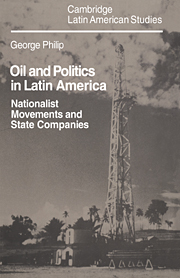Book contents
- Frontmatter
- Contents
- List of tables
- Preface
- Glossary
- Abbreviations
- Note on currencies and other units of measurement
- Maps: Latin America in 1920, 1940, 1960 and 1981; showing importing countries, exporting countries and countries self-sufficient in oil
- Introduction: The politics of oil in twentieth-century Latin America
- Part I The world oil environment
- 1 The corporate ascendancy 1890–1927
- 2 Retrenchment and concentration 1928–41
- 3 The making of the post-war oil world 1942–55
- 4 The major companies in retreat 1955–70
- 5 The oil market revolution and its consequences for Latin America 1971–9
- 6 Latin America in the twentieth-century oil system
- Part II The major expropriations
- Part III The state oil companies
- Notes and bibliography
- Index
- CAMBRIDGE LATIN AMERICAN STUDIES
3 - The making of the post-war oil world 1942–55
Published online by Cambridge University Press: 23 December 2009
- Frontmatter
- Contents
- List of tables
- Preface
- Glossary
- Abbreviations
- Note on currencies and other units of measurement
- Maps: Latin America in 1920, 1940, 1960 and 1981; showing importing countries, exporting countries and countries self-sufficient in oil
- Introduction: The politics of oil in twentieth-century Latin America
- Part I The world oil environment
- 1 The corporate ascendancy 1890–1927
- 2 Retrenchment and concentration 1928–41
- 3 The making of the post-war oil world 1942–55
- 4 The major companies in retreat 1955–70
- 5 The oil market revolution and its consequences for Latin America 1971–9
- 6 Latin America in the twentieth-century oil system
- Part II The major expropriations
- Part III The state oil companies
- Notes and bibliography
- Index
- CAMBRIDGE LATIN AMERICAN STUDIES
Summary
If the position of the oil companies and their parent governments appeared highly insecure in 1941, apparent stability had returned by 1955. A part of this stability depended upon the ‘Pax Americana’, for the USA had emerged from its pre-war isolation to take over the leadership of what came to be known as the ‘Free World’. As a result, although the countries of Latin America enjoyed considerable attention from the USA during the war years, they came to be regarded increasingly as peripheral after 1945 when Washington's relations with Europe and the Middle East came to take priority. Moreover, the full importance of the oil discoveries in the Middle East became increasingly clear in the decade after 1945, and the attention of the major companies was also directed eastwards.
For the major oil-exporting countries, the 1942–55 period fell into two distinct phases. Until around 1948 the oil market was tight; the war had increased demand for oil and destroyed capacity, and the immediate post-war reconstruction also sharply increased world demand. Demand continued to rise after 1950 but could now easily be met from the prolific oilfields of Iran, Kuwait and Saudi Arabia; even the boycott of Iranian oil between 1950 and 1953 (which followed the nationalisation of Anglo-Iranian) barely affected the international market. As a consequence, the power of producer governments – considerable in the 1940s, when the Venezuelan government was able to pioneer a major shift in profit-sharing arrangements between government and company – was far less in the 1950s.
- Type
- Chapter
- Information
- Oil and Politics in Latin AmericaNationalist Movements and State Companies, pp. 61 - 82Publisher: Cambridge University PressPrint publication year: 1982



